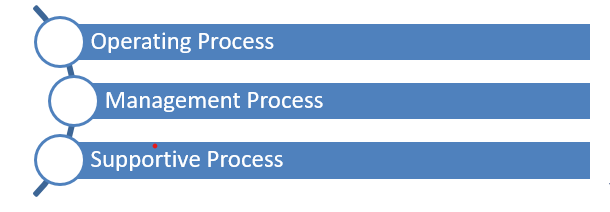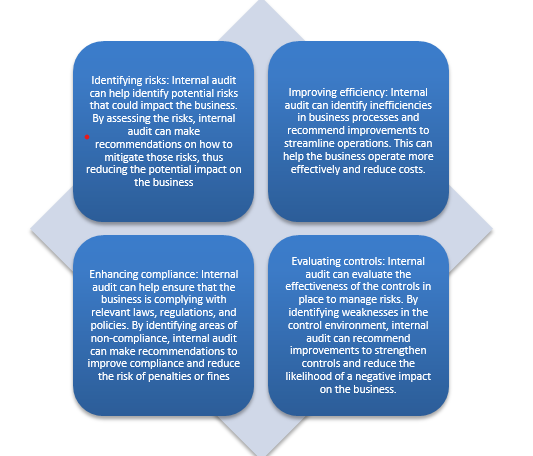Internal Audit edifying the Business Processes
Introduction
Internal audit and business process are closely linked as the primary functions of internal audit are to provide assurance on the effectiveness of an organization's internal control and risk management processes whereas business process refers to a series of linked activities that are performed to achieve a specific objective. Starting from the procurement of goods to the distribution of the product to the end customers companies formulate standard operating procedures (SOPs) which are a well-designed list of policies that are to be followed by the company’s personnel while performing their activities.
Decrypting Internal Audit in Business
Let us decode how Internal audit plays a significant role to assess and bringing improvement in the business process of the organization.
There are mainly 3 types of business process:

Operating Process:
These are the main functions of the business. These are the process on which the entire function and operating performance of the entity depend upon. They are also known as primary processes. A continuous review of these is necessary to fill up the gaps and flaws and to meet up the dynamic need of the business environment.
Eg: - Purchase to Pay cycle, Order to cash cycle. The primary process for garment companies would be the purchase of raw fabric and conversion of the same into finished goods and distribution of the same.
Management Process:
It is a process that consists of all the management functions starting from planning, Organizing, coordinating, and controlling. These processes are goal oriented. Persons at a high level of management are generally included in these processes. It is the management that formulates policies, plans, and procedures for the smooth functioning of operating processes.
Supporting Process:
These processes are not related to the delivery of goods or services to the customer directly. However, it provides helps to create an environment where the primary process can perform better.
Summary of the value addition done by Internal Audit can be seen as follows

Internal Audit thus helps in developing a systematic process in critical function within organizations, providing an independent and objective evaluation of an organization's internal controls, processes, and systems.
Understanding the applications of Internal Audit in Business Processes
In Procurement, Production and Payment Process
- Identification of areas where the procurement process can be improved, such as reducing cycle time, increasing cost savings, or enhancing supplier performance management. They can also identify potential risks and recommend ways to mitigate them.
- Review of the company's production policies and procedures to ensure they are effective, efficient, and aligned with best practices. This includes reviewing processes for production planning, scheduling, quality control, and inventory management.
- Monitoring and measuring production performance against key performance indicators (KPIs) and provide regular reports to management. This can help identify areas where performance is lacking and recommend actions to improve it.
- Internal audit can review payment policies and procedures to ensure they are effective, efficient, and compliant with relevant laws and regulations. This includes reviewing processes for invoice processing, payment authorization, and payment disbursement.
In Revenue to Receivables Process
- Evaluation the current process for revenue recognition, billing, and collection to determine whether it is efficient and effective. This can involve reviewing policies and procedures, identifying bottlenecks or inefficiencies
- Keeping track of leakage due to inaccurate billing, underpricing, or revenue recognition errors. This can help the company recover lost revenue and prevent future losses.
- Internal audit can help streamline the collections process by identifying opportunities to automate or improve the process. This can involve analyzing the aging of accounts receivable, reviewing collection policies and procedures, and evaluating the effectiveness of collection efforts.
- Assessment of contracts and agreements to ensure that they are properly structured and that revenue recognition is appropriate. This can involve assessing the contract terms, identifying potential risks, and ensuring that revenue is recognized in accordance with the terms of the agreement.
- Standardizing communication and collaboration between departments involved in the revenue to receivable process. This can involve establishing clear lines of communication, ensuring that information is shared in a timely manner, and promoting teamwork and collaboration.
In alerting management regarding various Red Flags
- Internal audit can gain a deep understanding of the organization's operations, systems, and processes. This enables them to identify areas where there may be an increased risk of fraud or other types of misconduct
- Internal audit can analyze financial and operational data to identify trends or anomalies that may indicate fraudulent activity. This can include looking for unusual transactions, discrepancies, or patterns that do not match expectations
- Internal audit can investigate red flags, such as unusual transactions or pattern, to identify potential fraud. They can also perform background checks on employees handling cash and identify any conflicts of interest
- Internal audit can use data analytics tools to identify potential red flags. This can include using algorithms to flag suspicious transactions or patterns that may indicate fraudulent activity.
There is also a statutory requirement under India`s Companies Act, 2013 for specified companies to have their Internal Audit done every year. An Internal Auditor can bring valuable insights and recommendations to improve the process of a company, leading to increased efficiency, reduced costs, and improved competitiveness
Example
Purchase to Pay Cycle:
M/s ABC Limited has a common process to order cow, cork, and buffalo leather materials from different market vendors. Below are the common risks in purchase to pay cycle
- Delay in receipt:
The internal auditor can provide a monthly report of the vendors to the entity who have delivered the goods to the entity after the delivery date agreed upon. And the track of such vendors can be made and added to the blacklist for not continuing any further transactions with such vendors on continuous default. This will ensure in meeting future dealing with the customers and will reduce idle production hours.
- Misappropriation in ordered quantity
A reconciliation between the quantity ordered and the quantity actually received is must essential internal check an entity can check. It is in the scope of the internal auditor to provide a business process improvement point to the businesses. An Internal Auditor can suggest to provide a person receiving the goods with access to view the PO copy into the system and right to comment if there any deviation.
- Delay in Payment:
The internal auditor can suggest the company to have a proper distinction between the vendor type whether the same is registered under MSME or a normal vendor while creating the vendor master into the system. Any delay in payment to the MSME vendors beyond a specified date will lead to an interest cost to the company.
Conclusion
Internal auditors work with all levels of an organization to identify potential risks and provide recommendations for improvement. They review financial and operational data, assess internal controls, and evaluate the effectiveness of the organization's risk management practices. Through their work, internal auditors provide insights and recommendations that help the organization achieve its strategic objectives while minimizing risk exposure.
Authors:
Umesh Vishwakarma
Manager | Email: umesh.vishwakarma@masd.co.in | LinkedIn
Manav Bokadia
Associate Consultant | Email: manav.bokadia@masd.co.in | Linkedin
Shubham Yadav
Associate Consultant | Email: shubham.Yadav@masd.co.in | Linkedin


.svg)

